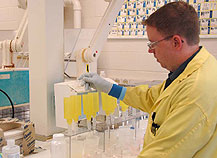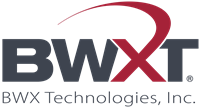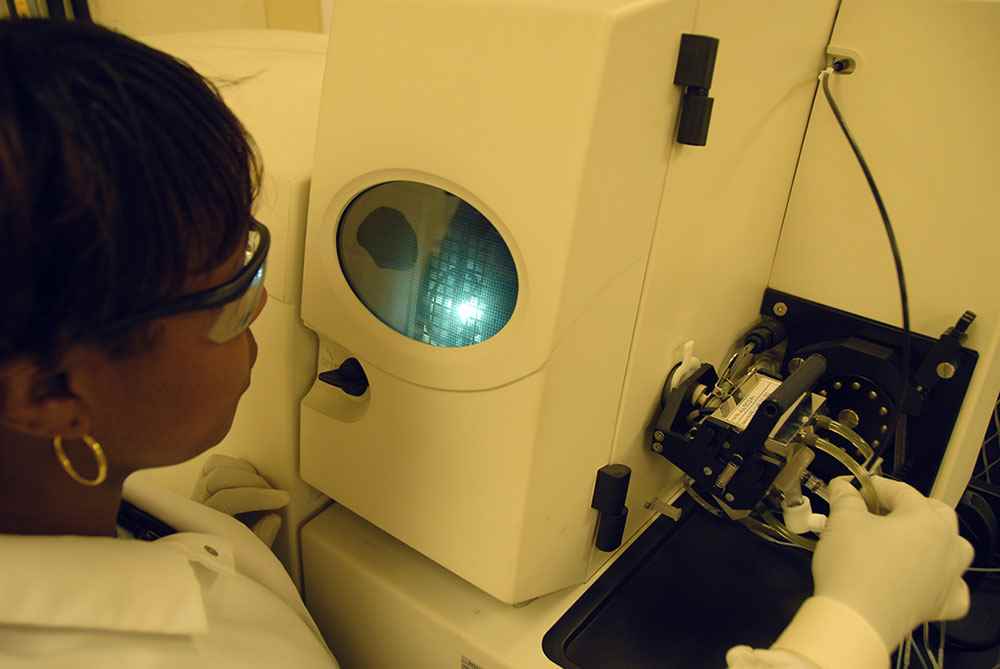BWX Technologies, Inc. (BWXT) has been providing comprehensive chemical and radiochemical monitoring, sampling, and analytical services for over 40 years.
Founded in the early '60s as a research facility, the Radioisotope and Analytical Chemistry Laboratory (RACL) has become a key provider of specialty services associated with commercial and government decommissioning and site remediation efforts. Our laboratories operate under NRC licenses and EPA permits. These qualifications allow RACL to receive virtually all types and quantities of radioactive materials. RACL is a DOECAP-qualified supplier to the U.S. Department of Energy and has successfully completed a nuclear utility audit of RACL's compliance with Nuclear Utilities Procurement Issues Committee (NUPIC) requirements. RACL is also National Environmental Laboratory Accreditation Program (NELAP) accredited by the Virginia Division of Consolidated Laboratory Services (VELAP ID #460127) and the Utah Department of Health (ELCP ID# BWNU).
RADIOCHEMISTRY LABORATORY
The radiochemistry laboratory performs analyses on a wide range of matrices, such as soil, water, decommissioning debris, waste, and mixed waste samples. The laboratory also has secure facilities to accommodate classified samples. Radiochemical analyses are performed for alpha, beta, gamma, and X-ray emitting isotopes. Examples of recent projects include the characterization of Battelle Columbus TRU waste, Savannah River Site tank waste and TRU-bearing filter media from Los Alamos National Laboratory.

ANALYTICAL CHEMISTRY LABORATORY
The analytical chemistry laboratory offers a variety of techniques for the characterization of radioactive inorganic materials. These techniques include quantitation of elemental species by Inductively Coupled Plasma/Mass Spectroscopy, mercury analysis by Cold Vapor Atomic Absorption, Ion Chromatography for the analysis of samples, and X-ray Diffraction to identify crystalline phases in compounds.
LABORATORY CAPABILITIES
Below is a summary of the analytical instrumentation techniques offered by the NELS:
- Alpha Spectroscopy for the analysis of: Am-241, Am-243, Cm-242, Cm-244, Np-237, Pu-238, Pu-239/240, Pu-242, Th-228, Th-230, Th-232, U-232, U-234, U-235 and U-238
- Gamma Spectroscopy for the analysis of various gamma emitters
- Gas Flow Proportional Counting (GPC) for the analysis of: Gross Alpha, Gross Beta, Sr-89 and Sr-90
- Liquid Scintillation Counting (LSC) for the analysis of: C-14, H-3, Ni-63, Pu-241, Sr-89, Sr-90 and Tc-99
- Low Energy Photon Spectroscopy (LEPS) for the analysis of: Fe-55, I-129 and Ni-59
- Cold Vapor Atomic Absorption (CVAA) for the analysis of mercury
- Inductively Coupled Plasma/Mass Spectroscopy (ICP/MS) for the analysis of various metal species
- Ion Chromatography (IC) for the analysis of: Chloride, Fluoride, Nitrate, Nitrite, Phosphate and Sulfate
- X-ray Diffraction (XRD) for the identification of crystalline phases in samples
- Scanning Electron Microscopy (SEM) for high magnification visual inspections
- Energy Dispersive Spectroscopy (EDS) and Wavelength Dispersive Spectroscopy (WDS) for the microchemical analysis of solids
- Electron Microprobe for the microchemical analysis of solids

